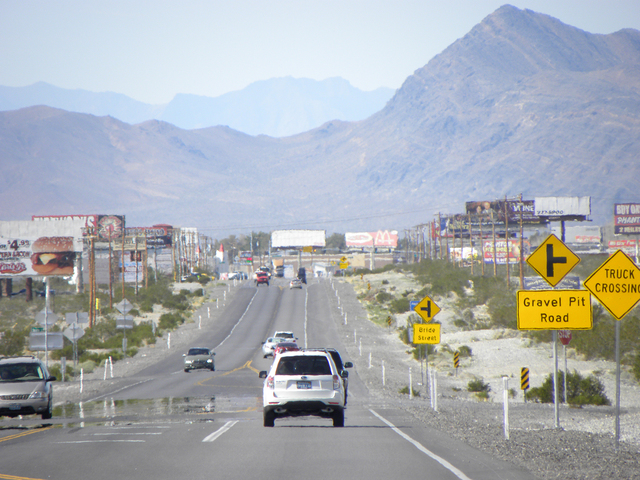Early resident helps wed Pahrump to civilization
Editor’s Note: This is the first in what the Times plans to be a monthly article on the people who help make modern Pahrump and its social history.
When I moved to Pahrump in 2005 I was completely devastated and excited at the same time.
On the way from Baker to Pahrump, when you look out of the windows of the car, it appeared to me that we were on the moon. Nothing but wide open wild looking spaces. I could look around and see scenes from many western movies or at least the possibilities. As I continued to look I saw things for every conceivable kind of movie backdrop.
I wonder how many movie scouts have felt the same?
After reaching Shoshone and turning to head towards Pahrump in about three minutes I saw the black dinosaur blood running through the rock formations. Wow!
This local spot is almost a must-see for everyone. Although it looks like plain old coal if you allow the imagination to run wild …dinosaur blood.
Once in Pahrump everything was a little different, almost like civilization on a rural scale. We moved to Pahrump to find a home for a President Lincoln collection at the Pahrump Valley Museum. Meeting with Harry and Mary Ford was like walking and talking with a living encyclopedia of local information. Some recollections, some facts and some undocumented local lore. This mixture of information gave me the basis to do my own research about this growing, shrinking and expanding wide spot in the road that is sometimes referred to as a bedroom community for Las Vegas.
There has been several books written about the early history of Pahrump, one of note was by Robert D. McCracken in 1990, but nothing or very little about the modern era. Through a series of articles I hope to provide a little insight into what we see here now and how it came to be.
Such as introducing to you a really colorful and effective character that few remember.
Dorothy Dorothy was instrumental in keeping the political pressure and social consciousness stirring and in the public eye enough to spearhead the paving of Highway 160 from Las Vegas to Pahrump. Once the Highway 160 ceremony was to take place she organized a mock wedding to commemorate the joining of the two entities.
The Vegas to Pahrump union became a party, public happening and was in the papers. Dorothy loved to call attention to things that would promote community interest and growth.
Dorothy Richardson Varnum MacAdam Dorothy was from a large family in Yreka, Calif. Her parents James Buchanan Richardson and Lulu Cooley lived and work as farmers. Dorothy was the seventh of their eight children, and grew up and had a natural inquisitive nature. She wrote poetry during her school years, and she and her sister Lulu were a popular singing duo in northern California. She was determined to be informed, interested and on the edge of change.
She attended San Francisco College and opened her own brokerage firm. She was not a one-trick pony, as the saying goes. Attending classes as to whatever piqued her fancy at the time, Dorothy had a little knowledge about lots of different things. She like arts and crafts, politics, flying, golf and other subjects. Today she would be called an entrepreneur. She learned to fly, knew Amelia Earhart, who formed a women’s flying club called Flying 99’s, of which Dorothy was a member.
Dorothy worked for Shell Oil Company in the statistical department. After a back injury she went to Palm Springs to recoup. Staying with another sister, Beth Chase, she decided to write a “chatter” column for the local newspapers. When she returned to work after Pearl Harbor she went to work for Northrup in the payroll department.
She married John Moore MacAdams in 1943 and was widowed in 1945. She married Dale B. Dorothy who was a Pan Am pilot who served in Lima, Peru in World War II He was flying for Pan Am when they met. They had a brief stopover in Las Vegas and stayed. Dorothy Dorothy’s civic involvement touched many parts of the community. She organized and was the first president of the Women’s Democratic Club of Whitney. She helped organize several local clubs for this group including one in Pahrump, Boulder City and Blue Diamond. She was also a member of Las Vegas Press Club and many other supportive Clubs of her causes.
In 1949, the Dorothys bought a 1,400-acre alfalfa and cotton ranch in Pahrump. She actively started promoting the potential of Pahrump. However at that time the lifestyle was “primitive.” There were no paved roads, telephones or electricity. Dorothy rolled up her political sleeves and worked to make a paved road to Pahrump which became a reality in 1954 when the road was opened.
Dorothy Dorothy wrote for several of the Southern Nevada newspapers, including the Las Vegas Review-Journal from 1949 to 1958. She also wrote a weekly column for the Las Vegas Sun, wrote for the Tonopah Times for nearly 10 years, and Henderson News about two years.
She also wrote agricultural articles for California Farmer in the 1950’s.
Dorothy Dorothy returned to Las Vegas to live in 1958 where she continued her pathway into community activism. Her husband Dale Dorothy died from cancer on August 26, 1982. Dorothy died on October 31, 1986.
The road between Pahrump and Las Vegas is a good highway to travel, not to mention the shortest way for many to get to work, shopping and relaxation activities. The road today is a marvel of modern engineering, planning and road technology. Difficult for me to understand how this paved road was not an actual road till the the mid 50’s.
I’ve never lived anywhere without paved roads.
Constance Wright is on the Pahrump Valley Museum Board of Directors where she serves as research, creative development and funding chair.

















